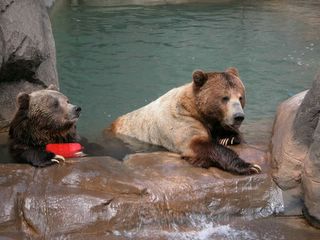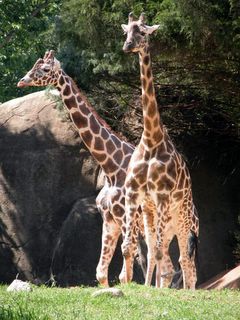It's hard to imagine that anyone who wants to read Kazuo Ishiguro's
Never Let Me Go hasn't already learned through the various reviews what the book is really about, but if you haven't and you want to remain unspoiled, you might want to skip over the next four paragraphs.
Near the end there's a conversation that put me in mind of what little I've read of Temple Grandin, of how she's worked to reform the treatment of cattle in the meat industry, of how she's sought to bring peace and calm to livestock in their final moments of life through her design of holding chutes in the slaughterhouses. I couldn't help thinking that the clones in Ishiguro's novel have lived lives that have brought them the same type of calm acceptance toward their prescribed fates when the reader wants them to do nothing but rail against it, to bolt and blend in with the humans somewhere else.
Someone's put forth the supposition in the on-going discussion at Readerville that Ishiguro has actually written an animal rights book; the clones are merely a means of humanizing animals that we routinely oppress to suit our own purposes. This type of reading makes quite a bit of sense to me since otherwise the characters' passivity toward their fates on top of the fact that it must be a lot more economical to clone organs for harvesting rather than entire people makes the book feel less clever than we all know Ishiguro to be.
Kathy provides a maddening perspective to tell the story through; she's limited in what she knows, so therefore unreliable as a narrator; she's obsessive over minor details and vague on the big picture, leaving Ishiguro no other choice but to provide an "explains all" scene towards the end.
So. Maybe a cross between Margaret Atwood's
The Handmaid's Tale and Michel Faber's
Under the Skin?
____________
"The man cited a passage from the Talmud, from Brachot. He told the mourners that according to the Talmud, a man who has lost his mind is like the broken tablets that Moses shattered, which were gathered up and carried in the Ark of the Covenant along with the new pair. The broken tablets are also precious, the man said, though we do not know what role they were meant to play."
Unfortunately, I know exactly what role the man who lost his mind is supposed to play in
Joy Comes in the Morning. Rosen uses Neal to bring a cheap thrilleresque edge to the wedding plans he's been working toward. Not only does Lev's schizophrenic friend see fit to kill his mother with a hammer, but he frightens Lev's parents before ever-so-brave rabbi-finance Deborah lets him into her apartment, then, after locking herself safely away from Neal in the bedroom, determines to go back into the living room where he is after being told by Lev over the phone that Neal had attacked his mother.
Of course, ever-so-brave but prone-to-tears Deborah is saved by another pet peeve of mine: character goes out the window. He plunges headfirst, last words we're told he thought being
Water! Water! because that will make an ever-so-lovely parallel with Deborah's own plunge (and yes, plunge is the word used in both places) into the mikvah pool three chapters later on.
What a lark! What a plunge!Ugh.
And all those tears that had bugged me throughout? That I thought someone should have warned Rosen about? Twice within five pages near the end he defensively quotes Psalms: "Those who sow in tears will reap in joy." Just in case we didn't understand the title already from the first psalm he quoted, you know.
So, personal pet peeves encountered in this book:
Shifting Perspective (a sign of laziness on the writer's part in contemporary fiction in most cases I've seen)
Characters Who Cry Too Much (only acceptable in country music)
Mentally ill character killed off after killing off another minor character in a horrible fashion so main characters can be brave and sad but resolute while the readers can be expected not to really care because mentally ill character had gone bad and scary on top of being mentally ill. (cheap trick)
Suicide by jumping out the window (unless you're V. Woolf or Michael Cunningham riffing off V. Woolf. I sure hope Ian McEwan doesn't do this in
Saturday.)
__________
New from the library:
Jeannette Walls'
The Glass CastleTemple Grandin's
Animals in Translation


















